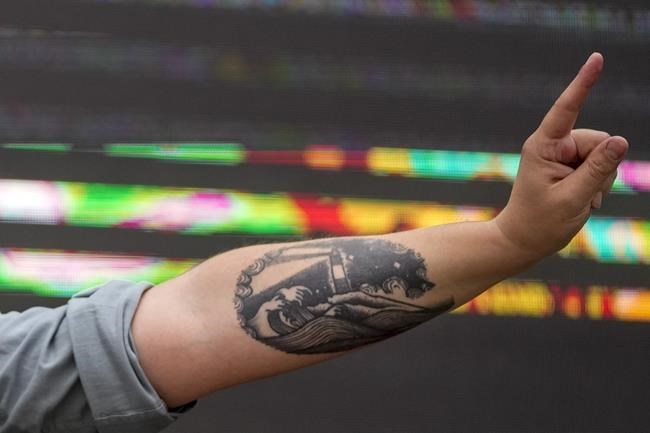SANTIAGO, Chile (AP) — When Gabriel Boric is sworn in as Chile's president he'll not only be the youngest to lead the South American country but also the first in Latin America to sport several tattoos.
The question is whether he'll openly display them.
One person hoping he does is Yumbel Góngora, the self-proclaimed “tattoo dissident” who inked the three elaborate designs that fill Boric's arms and back with sweeping imagery from his native Patagonia region.
“It's important that a person never forgets their roots. That always keeps you focused on where you are and what’s important ... not get lost in the fame,” Gongora told The Associated Press while taking a break at her parlor in downtown Santiago decorated with artwork containing feminist slogans.
Boric, 35, scored a historic victory in Sunday's runoff over a one-time admirer of Donald Trump after campaigning on a promise to that he and leftist supporters argue is the unacceptable underbelly of a free market model imposed decades ago by the dictatorship of Gen. Augusto Pinochet.
Since his days as a student protest leader, Boric has made a career of flouting conventions. He shunned the traditional suit and tie when he was elected to congress in 2014 and instead wore rock band T-shirts, jeans and once even a Mohawk, all the while drawing the ire of traditionalists.
“I couldn't care less,” he said at the time, dismissing the conventions as “a tool of the elites to distinguish themselves from the low people.”
But he adopted a decidedly more conformist look in the run up to Sunday's runoff election — still no tie, but a dark sport coat, dress shirts and well-groomed beard — to on edge about voting for an untested millennial who counts among his supporters Chile's Communist Party.
GĂłngora said she studied old maps of Chile for months in coming up with the first tattoo she designed for Boric nearly a decade ago: a map of the ice-capped islands and labyrinthine fjords near where both grew up in Punta Arenas, at the tip of the South American continent.
Later, she designed two more: a lenga tree twisted into knots by the strong southern winds and an end-of-world lighthouse shining into emptiness that Boric had carved into his left arm during a battle with depression.
“A lonely Magellan lighthouse among the stormy and mysterious seas of southern Patagonia,” Boric said in a showcasing Góngora's body art. “I'm going to live there one day but in the meantime it lives with me.”
Góngora, whose dyed green hair, piercings and tattoos are something of a walking advertisement for her university-trained artistry, said Boric always stood out among her urban hipster clientele because of his humility — something she attributes to his upbringing far from the capital.
But she felt betrayed by her fellow activist when in November 2019 he negotiated a deal with allies of President Sebastian Pinera to put an end to nationwide protests in exchange for a commitment to hold a plebiscite on rewriting the Pinochet-era constitution. It was a risky political decision that at the time cost Boric the support of hardliners like Góngora, who identifies as a “anarchist-feminist.”
Like huge numbers of often apathetic Chilean youth, she nonetheless voted for Boric in the runoff, fearing his conservative opponent — José Antonio Kast — would be a major setback for women, indigenous rights and Chile's LGBTQ community.
In her binder sits the sketch for yet another tattoo for Boric — its design a secret — that the two discussed a while ago. With the demands of his new job and the future of Chile riding on his shoulders, she doesn't know if she get to ink it, though.
“I'd hope he doesn't stop being a rocker,” Góngora said. “But I don't know if that will fly in politics. Then again, nobody ever expected such a young president.”
___
Associated Press writer Joshua Goodman in Miami contributed to this report.
Patricia Luna, The Associated Press


